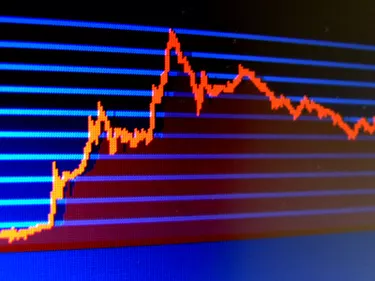
Many people want to try making money in the stock market. Ideally, they would make short-term investments and realize gains every day without investing a lot of capital. Many investors seek profitable stocks to trade or "quick money" stocks. Still, the truth about the stock market is that it generally takes a lot of discipline, resources and time to be a successful investor.
Limitations of Quick Money Stocks
Video of the Day
Day trading refers to buying and immediately selling stocks or other equities within the same day or trading period. This is generally done with large quantities of cheap stocks to maximize profits on small changes in price and market fluctuations. This practice is in contrast with the more conservative, but ultimately much less risky and statistically much more successful, practice of buying smaller amounts of more expensive stock and holding that position for a long time. While day trading sounds attractive to many people, it is exceedingly difficult, and rare, to succeed at it. Moreover, and contrary to most people's impression or conception of it, day trading also requires a very significant amount of capital upfront.
Video of the Day
Writers for The Financial Industry Regulatory Authority (FINRA) explain that FINRA requires pattern day traders to maintain equity of $25,000 in their margin account in order to have access to the market. You can explore this further with information from the SEC on day trading, as well as their updated page about it. This equity does not count the money you need to actually execute trades, which most recommendations pin at $10,000 minimum.
A "pattern day trader" is an investor who makes four or more day trades in a five-day period, so this stipulation is not even reserved for particularly prolific day traders. Moreover, time and extensive research have shown that just like actively managed funds rarely outperform passive funds, conservatively speaking, less than 5 percent of day traders beat the average historical market return of 9.8 percent.
Data Surrounding Day Trading
Data from a comprehensive study from UC Berkeley and the day trading statistics site VantagePoint Trading both support this. Even if success is defined simply as not actively losing money by day trading, the success rate only climbs to 6 percent.
If you choose to pursue day trading, keep in mind that you will need to look out for fees and other brokerage costs due to the high volume of trades. Compare the best day trading platforms and best trading apps for the features that best suit your needs, as broken down by resources like StockBroker.com and Forbes.
Ways to Make Money With Little Capital
While day trading is extremely risky, that doesn't mean that the stock market overall or low-capital investments are a complete bust. Several changes in stock market technologies and culture have opened doors for profitable low-capital investing if you're willing to do research and play the long game.
For example, the team at CNBC explains how the relatively recent innovation of being able to buy fractional shares has made expensive profitable stocks and exchange-traded funds (ETFs) accessible to average investors. CNBC advises investing in mutual funds first before venturing into individual stocks, and the team at Forbes gives the same advice. The latter explicitly adds the accepted common wisdom: buy and hold. Investing small amounts at frequent, regular intervals lets you capture the gains of the general upwards trajectory of the market, outpacing inflation and other decreases in monetary value and purchasing power.
While "buy and hold" is the most reliable bet, it's slow and conservative. Writers from Entrepreneur.com provide several more creative ideas for short-term, low capital investing, such as flipping real estate contracts (the contracts, not the real estate properties themselves) or using peer-to-peer lending platforms to earn interest on low-principal, short-term loans. In all cases, active trading and investing require research, determination and patience.
Consider also: Day Trading Options in IRA Accounts
- FINRA: Day-Trading Margin Requirements: Know the Rules
- SEC: Margin Rules for Day Trading
- UC Berkeley: The Behavior of Individual Investors
- VantagePoint Trading: What’s the Day Trading Success Rate? The Thorough Answer
- Stockbrokers.com: Best Day Trading Platforms for 2021
- Forbes: Best Online Brokers For Day Trading
- CNBC: How to get started investing with as little as $1
- Forbes: How To Make Money In Stocks
- Entrepreneur.com: 7 Quick Ways to Make Money Investing $1,000